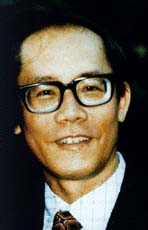

1942 Born in Ha Dong.
1965 Received Bachelor degree in education from University of
Saigon.
1971 Received Doctorate in education from Florida State University in
Tallahassee.
Returned to Vietnam and is appointed Vice President of Van Hanh
Buddhist University in Saigon.
Aug. 28, 1976 Arrested without charge during a government campaign
to "re-educate" South Vietnamese intellectuals, and
detained without trial in Chi Hoa prison in Ho Chi Minh
City for 12 years.
Feb. 9, 1988 Released from prison; release form charged Dr. Hoat with
having been an "anti-socialist reactionary."
Nov. 17, 1990 Arrested at his home in Ho Chi Minh City, because of his release
of the Freedom Forum newsletter, and held without
charges at Unit 4, Phan Dang Luu jail in Ho Chi Minh City
for 27 months. This was a gross violation, of the obligation to
set a reasonable limit on pre-trial detention, on the part of the
Vietnamese communist regime´
May 28, 1992 The state-run Saigon Giai Phong newspaper published an
article entitled, "Smash the Dark Schemes of the Reactionaries
at Their Sources," condemning Dr. Hoat and other Freedom
Forum participants.
June 14, 1992 Dr. Hoat's wife, Tran Thi Thuc, from fears that the Saigon
Giai Phong article effectively announced a verdict on his
case before he was even tried, publicly released a letter
to the authorities clearly stating that the publication of the
article violated her husband right to an impartial trial.
Nov. 1, 1992 Dr. Hoat issued a public statement from prison to the leaders
of the Communist Party calling on them to launch the process
of "dialogue and national reconciliation among all Vietnamese
Patriots within and outside the Communist Party, as well as inside
Vietnam and overseas." The letter called for the release of all
political detainees, and the implementation of civil and
political freedoms.
March 23, 1993 Transfered to Chi Hoa Prison, Sai Gon (Ho Chi Minh City).
March 30, 1993 In a two-day closed trial, Dr. Hoat was sentenced to 20 years
imprisonment on the charge of "attempting to overthrow the
government." Closed trials grossly violate article 14
of the International Covenant on Civil and Political Rights,
to which Vietnam is a signatory.
May 27, 1993 Asia Watch called upon the Vietnamese government to allow
international observers to attend the appellate hearing of
Dr. Hoat and the other Freedom Forum members.
July 9, 1993 Dr. Hoat received a token sentence reduction from 20 years
imprisonment to 15 years imprisonment with 5 years to parole´
This two day hearing was not announced or made open to the
public, although family members of the defendants were
permitted to attend.
July 17, 1993 Transferred to labor camp Z30D, Ham Tan, Thuan Hai province.
Sept 1, 1993 Dr. Hoat released letter from inside Ham Tan labor camp in
which he wrote: "If brute force appears to overcome us
momentarily, we can not be overcome... we must not abandon
the way of non-violent, peaceful struggle."
Nov. 10, 1993 A public letter by Dr. Hoat entitled "Human Rights from the
Human and Social Perspectives" was delivered to visiting
Australian Senator Jim Short and was later published in
Australia on International Human Rights Day, December 10,
1993. The authorities denied Senator Short's request to
meet Dr. Hoat during his trip, but he did meet with Dr.
Hoat's wife, Tran Thi Thuc.
Following Senator Short's visit, Dr. Hoat was transferred to
Chi Hoa Prison in Ho Chi Minh City, where he was kept in a
small crowded cell, and denied access to his family, who were
also prevented from bringing him medical supplies.
Dec. 16, 1993 Dr. Hoat was moved to camp A20 of Xuan Phuoc prison in the far
northern province of Phu Yen. This prison, reported to be
one of the worst in Vietnam, is a three day jouney from
Ho Chi Minh City, and is very secluded from all populated
centers.
Jan. 1, 1994 Dr. Hoat released a letter from Xuan Phuoc entitled "Summary
Report on Human Rights in Vietnam," which documented human
rights and civil rights violations in Vietnam, and suggested
policies to improve the situation.
Jan 20, 1994 Dr. Hoat sent a letter from Xuan Phuoc to the National
Conference of the Communists Party of Vietnam, suggesting
ways to establish a multi-party democracy.
Feb. 24, 1994 Transferred to the remote Ba Sao labor camp in Phu Ly, Nam Ha
province in northern Vietnam.
Early Apr.1994 Dr. Hoat and four other prisoners were placed in leg and
arm shackles for refusing hard labor duties. Dr. Hoat
began a hunger strike in response to their being shackled.
Apr. 22, 1994 Human Rights Watch/Asia and the U.S. Department of State
requested information from the Vietnam's Mission to the U¤N.
regarding Dr. Hoat's situation upon learning of his shackling
arm shackles for refusing hard labor duties. Dr. Hoat
began a hunger strike in response to their being shackled.
Apr. 22, 1994 Human Rights Watch/Asia and the U.S. Department of State
requested information from the Vietnam's Mission to the U¤N.
regarding Dr. Hoat's situation upon learning of his shackling
and hunger strike´
Apr. 24, 1994 Dr. Hoat was transferred to a camp for hardened criminals at
Thanh Cam prison, in Thanh Hoa province northern Vietnam.
from the Thanh Hoa provincial capital by bus and ox cart.
It is currently unknown whether Dr. Hoat is continuing his hunger strike,
or if he is still being held in shackles, as none of his family members
has been permitted to visit him since early February. His physical condition
has steadily deteriorated since his latest imprisonment, and he critically suffers
from a kidney disorder for which he requires regular medication.

 Back to main
page
Back to main
page